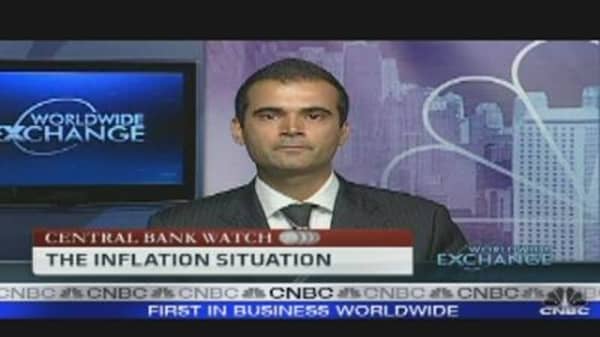A request for an extension to the repayment period on Greece’s bailout loan from the International Monetary Fund and the European Union could be a precursor to the full restructuring of the country’s debt, analysts say.
George Papaconstantinou, Greece’s finance minister, told a recent press conference that his government had no intention of restructuring its debt or negotiating a haircut on outstanding bonds.
But in an interview published on Monday in Liberation, the French newspaper, he called for an extension to the repayment period and a reduction in the interest paid on the 110 billion ($160 billion) loan from the International Monetary Fund and European Union that rescued the country from bankruptcy in May 2010.
The country has already been given one extension – from three to seven and a half years – and a one percentage point average cut in the interest rate, down to four percent, in March.
Analysts say that, despite assertions to the contrary, an extension is likely to be a precursor to a full restructuring.
“An extension of the maturities will not solve Greece’s income and debt imbalances. It will leave the country’s debt stock unchanged and thus the reluctance of the market to buy into the IMF/EU debt programme will not change,” Andrew Bosomworth, head of Munich portfolio management at Pimco, told CNBC.com.
“I would label this form of reprofiling as a kind of ‘soft restructuring’, which would be a precursor to ‘hard restructuring’, which would mean principal reduction,” Bosomworth added.
With an IMF debt monitoring team due in Athens, the Greek government has been vocal about the measures it is taking to clean up its public finances and deal with the perennial problem of tax evasion.
On May 2, the finance ministry announced a crackdown, with a threat to name and shame offenders. The government hopes to raise just under 12 billion euros ($18 billion) by the end of 2013 through a restructuring of its tax operations.
Corruption Problem
Ioannis Diotis, a public prosecutor who gained recognition for tackling the 17 November terrorist group, has been appointed as head of the new Economic and Financial Crime Unit.
Greece’s corruption problem is among the worst in the European Union, according to the international watchdog Transparency International. The country scored 3.5 on TI’s 2010 Corruption Perception Index, putting it on level pegging with China and Colombia.
Some, such as David Lea, a Greece analyst with political risk consultancy Control Risks, remain skeptical. “No matter how many loopholes you close, they will find others (to evade tax),” Lea told CNBC.com.
The notion that high-profile individuals close to the government will find themselves hauled before the new unit is “not really very realistic at all,” Lea said. “It will be ordinary people who will have to come up with higher taxes.”
Likewise, any attempt to fully investigate offshore bank accounts or international front companies may run into trouble.
“I suspect that what will happen is that it will prove too difficult or take too long… or the people paid to investigate it will get better job offers elsewhere, which is par for the course,” he added.
It is likely that there will be a couple of high profile successes in the short term, Lea said, but they will probably be among individuals closer to the opposition New Democracy party than to the ruling Panhellenic Socialist Movement and will not pan out into a longer-term crackdown.
The 12 billion in projected revenues is “massively optimistic” Lea added. The country is improving all the time, but compliance to the levels experienced in Northern Europe, or even in Spain or Portugal, is “a long way away.”
“These sort of structural reforms are yielding positive results, but at the end of the day the country needs nominal economic growth,” Pimco’s Bosomworth said. “Greece can only succeed in one of two ways – through its own merits, and that could include massive privatization proceeds… or nominal economic growth; or it could succeed through transfers.”
Spiraling Debt
The lack of effective political mechanisms within the EU means that fast-track cash transfers are highly unlikely, he added.
In April, the finance ministry outlined plans to make 26 billion euros worth of public spending cuts and to raise 50 billion euros through the sale of stakes in infrastructure, telecoms and gambling assets.
Greece’s debt to gross domestic ration ran to 143 percent last year, and is expected to peak at 159 percent in 2012. The economy contracted by 4.5 percent in 2010, and the IMF forecasts that it will shrink a further 3 percent in 2011, returning to marginal growth in 2012.
European policymakers have been sending out mixed messages. The European Central Bank and the European Commission have been adamant that a default is not on the table, but others have been whispering that the once unthinkable is now inevitable.
“As investors, we have to look at the difference between nominative and positive economics – what we think the ECB should do and what it will do,” Pimco’s Bosomworth said. “They are in an extremely difficult situation. If they say anything even alluding to restructuring they may trigger capital flight, thus they are obliged to say that restructuring is not part of the plan."
“A Plan B would capitalize on the bank stress tests to map out as best as possible the impact on banks’ capital ratios as a result of hard restructuring,” he added.
The cost to the European banking sector of such a restructuring is hard to quantify, but research from Deutsche Bank suggests that a 50 percent haircut on Greek debt would lead to 160 billion euros in losses at European lenders, with Greek banks and the ECB itself bearing the brunt.
The central bank could stand to lose half of its 80 billion capital in such an event.
Policymakers face a difficult decision – to go for a hard restructuring now and let the banks take the hit – or to delay and see the country’s sovereign backers in the EU lose out.
Who to Believe?
The European Commission’s own estimates suggest that Greece will need to raise 26.7 billion in long term borrowing next year. Investors have shown that they have little appetite for the country’s debt, which means further cash injection from Europe could be the only option.
That would mean yet more pressure on European government finances and a further transfer of risk from the private sector to the public sector.
Restructuring and dropping the burden on banks could be dangerous, as some analysts have suggested that such a move could be a “Lehman moment” – with an impact on European stocks equivalent to the effect of the US investment bank’s bankruptcy in 2008.
Either way, policymakers need to make a decision, as previous examples of successful crisis management show that delays only add cost, according to Alessandro Leipold, chief economist of the Lisbon Council and a former acting director of the IMF’s European department.
Leipold – who has studied responses to previous crises in Latin America, Eastern Europe and Asia – wrote in a report, released Tuesday, that the EU’s insistence that debt restructuring is out of the question until 2013 is “an arbitrary and non-credible deadline.”
Speaking to CNBC.com, Leipold explained that the EU needs to not only accept the possibility of default, it needs to come up with an apolitical and unified response, which includes a single point of contact with the market.
“Communications is as much a tool as anything else in crisis management,” he said. “Right now a lot of market jitters come out of the market not knowing who to believe.”




